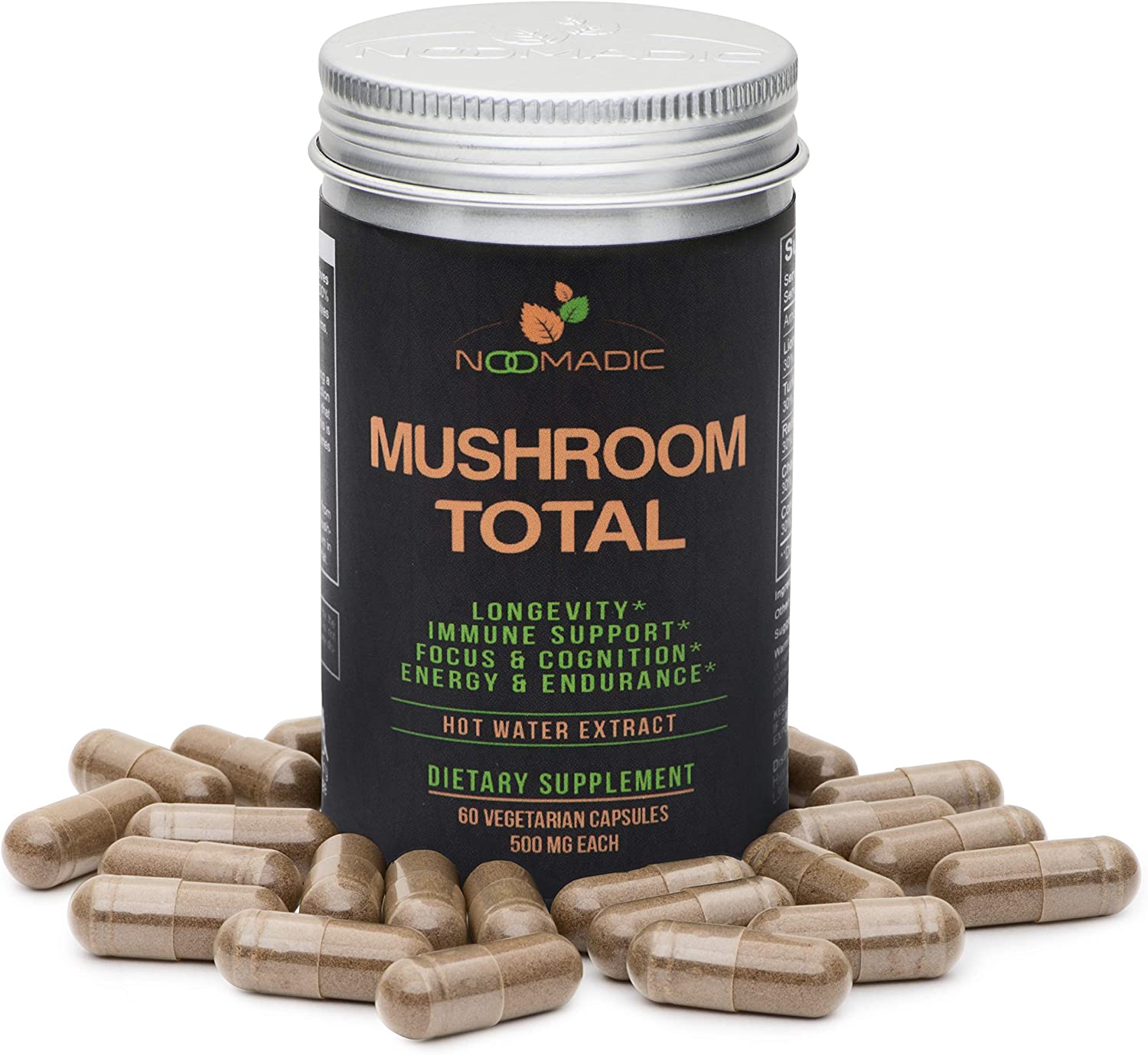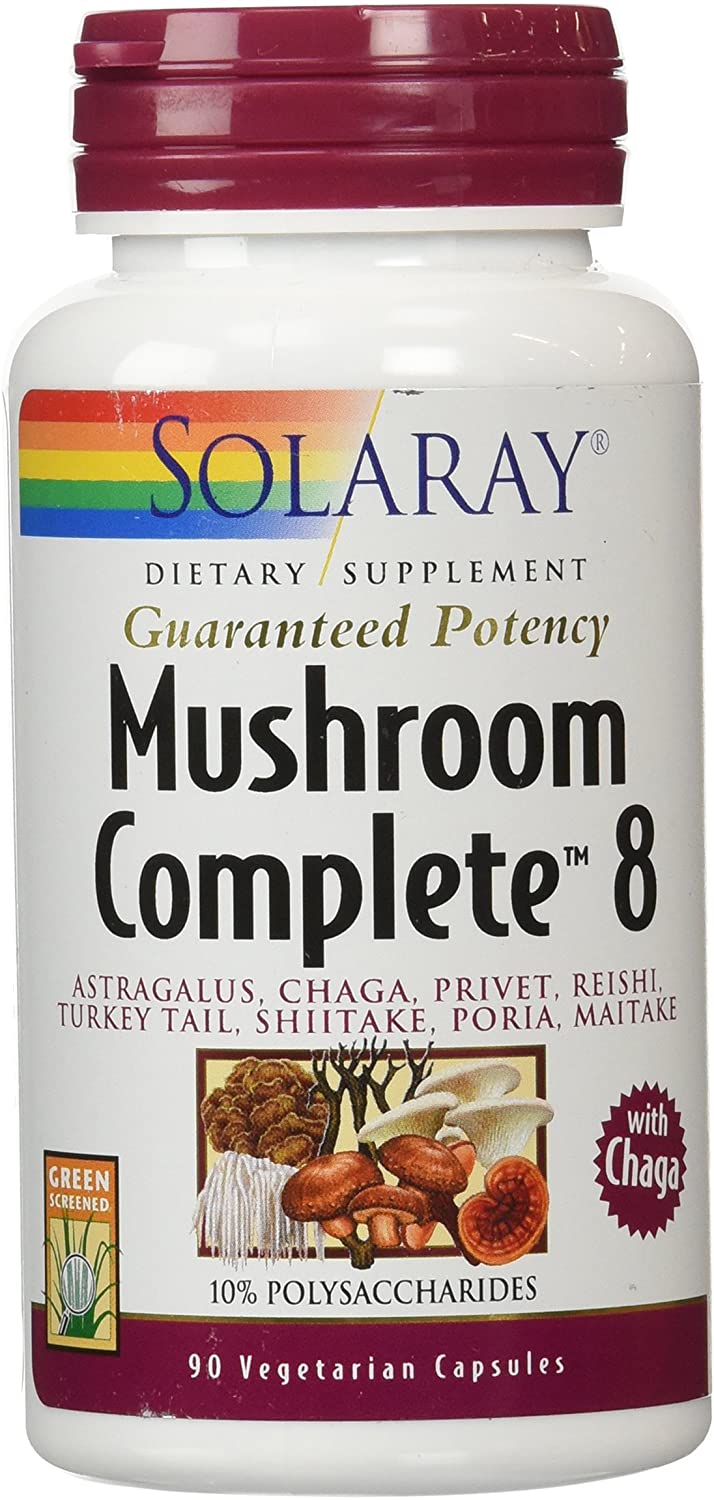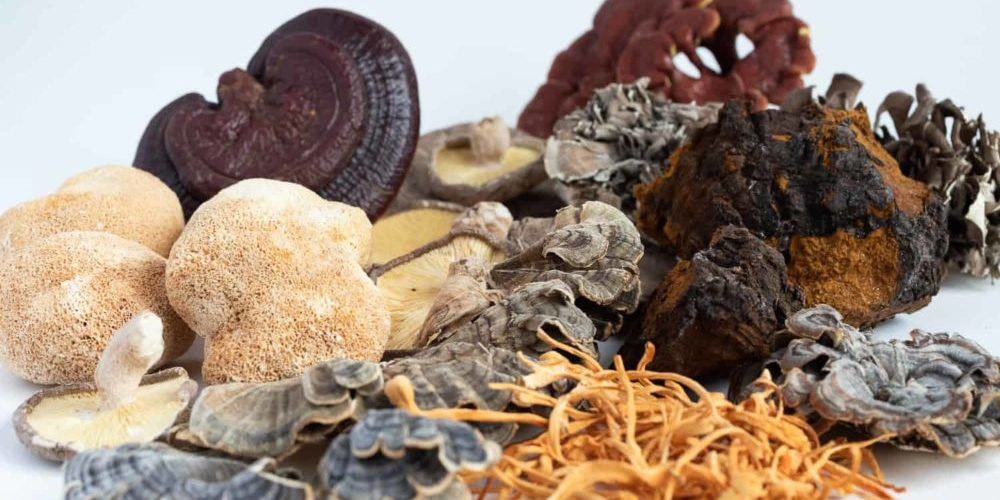People who love their dogs naturally want to give their dogs good and healthy things. Just as naturally, dog lovers who also happen to be mushroom enthusiasts want to but the best medicinal mushroom supplements for their dogs.
Edible mushrooms are delicious and nutritious to us, and medicinal mushrooms are a popular part of alternative healthcare beginning to be backed up (at least in some cases) by modern scientific research. But humans aren’t dogs. It’s well-known that there are things most humans can eat safely (like chocolate or onions) that dogs can’t—and vice versa. It’s also true that medicine works a little differently from one species to another. You wouldn’t give your dog your pills without talking to a vet.
So should you give your dog mushrooms?
Ultimately, definitive medical and nutritional advice for your dog ought to come from your dog’s vet, not the internet. But just to get the mental wheels turning—to give you an idea of what questions to ask—read on.
IMAGE | PRODUCT | Header | ||
|---|---|---|---|---|
OUR #1 RATED 30% Beta-D-Glucans | ||||
10% Polysaccharides | ||||
Can Dogs Take Medicinal Mushrooms Safely?
Can dogs take medicinal mushrooms safely? The short answer is that they can take what we can[i].
Unlike with plants, there are no known mushrooms that are safe for humans and poisonous for dogs. They seem to react the same way we do, more or less. That means that mushrooms toxic to us are also dangerous to them. Unfortunately, some of the most toxic mushroom species around smell interesting and taste great to dogs (to humans, too, reportedly). Dogs should not be allowed to forage for mushrooms on their own, because they can and will poison themselves that way.
Another problem is that many edible mushroom species taste great cooked with onions and garlic, both of which are poisonous to dogs. It’s not a good idea to share mushrooms off your plate unless you’re sure the rest of the ingredients are safe for dogs, too. It’s also not a good idea to give dogs raw mushrooms, unless the species is one known to be safe for humans to eat raw (most are not).
But any mushroom that is safe for humans to eat can also safely be prepared for dogs, yes. If there are exceptions, they have not yet been discovered.
What Benefits Do Medicinal Mushrooms Have for Dogs?
Mushrooms probably have the same nutritional and medicinal benefits for dogs as for humans. Practitioners recommend the same species for the same reasons to both human and canine patients. The tricky thing is there is very little research on the effectiveness of medicinal mushrooms in humans. There is even less for dogs.
In most cases, the existing research supporting the medicinal use of mushrooms is extremely preliminary. There might be encouraging studies that used experimental mice or rats or, in some cases, human tissue cultured in labs. Chemical studies identify the presence of substances thought to have certain benefits. Folk traditions thousands of years old recommend certain treatments (and are sometimes right and other times very wrong). For a few species, there are clinical experiments in human beings (rarely in dogs), but most of these are still small and preliminary. All of this is not to say that mushrooms don’t work—on the contrary, it is reason to believe that they probably do, it’s just that there are still a lot of unanswered questions. Basically, the jury is still out.
Experienced practitioners take all of this preliminary information, add in their own clinical experience, and make educated guesses. Some of those experienced practitioners are vets treating dogs.
What benefits a person can expect from mushrooms (for themselves or for their dog) depends on the species of mushroom. However, among the most popular, best-researched species, the following possible benefits stand out:
- Cancer Treatments
- Diabetes Treatments
- Anti-inflammatory Effects
- Antibiotics
- Anti-viral Effects
- Faster Healing of Wounds
- Weight Management
- Cardiovascular Treatments
Choosing the Best Mushroom Supplement for Your Dog
The best way to choose which medicinal mushrooms to give a dog is to ask a vet. But not every vet will be able to answer. Most vets do not know much about mushrooms and may be openly skeptical or dismissive, but there are holistic practices that combine standard veterinary medicine with alternative therapies, and many of these have experience with mushrooms.
But the reason to consult one of these vets is not their expertise in mushrooms, but rather their expertise in dogs.
First, none of the above-mentioned conditions (cancer, diabetes, and so forth) should be tackled by a non-expert alone, no matter how effective mushrooms are. And when a dog is being treated by a vet, the vet has to be made aware of all aspects of the dog’s care, because otherwise a mushroom remedy given at home could interact badly with a drug given by the vet.
The principle that mushrooms don’t replace doctors applies to human health, too, but dogs carry an added complication—they can’t talk.
Humans know how we feel, and we can learn how to self-diagnose to some degree. Dogs, too, know how they feel, but they won’t tell us. Most try to hide their pain and discomfort until things get really bad. The signals they do give are often ambiguous. Vets have the experience and the diagnostic equipment necessary to figure out what’s really going on, and only with an accurate diagnosis is choosing the right treatment even possible.
But if the vet doesn’t prescribe a specific brand of mushroom supplement, it’s important to know what to look for.
Buying Quality Supplements
With rare exceptions, medicinal mushrooms are best taken as powdered extracts or as teas—in whole mushrooms, the medicinal substances may not be concentrated enough, or may be hard to absorb. There are medicinal mushroom products made for dogs, though those made for humans are likely to be useful, too. But since mushroom products are not regulated the way FDA-approved medications are, it’s up to the buyer to make sure the product is safe and effective.
The rules for choosing quality mushroom products[ii] are the same, whether the intended beneficiary is human or canine.
- Buy extracts, not whole mushroom. Raw mushroom, whether fresh or dried and powdered, is nearly useless to dogs or humans since we cannot digest the chitin in fungal cell walls. Hot water extraction (basically making tea) melts the chitin and releases the medicinal substances. A secondary extraction process with alcohol may release even more, but alcohol extraction is useless if hot water extraction has not been done first. The extract may be sold in liquid form or dehydrated into a powder, either packaged loose or in capsules. The important thing is that it is a hot-water extract, not just powdered mushroom. A good article about buying a hot water extracted medicinal mushroom.
- Avoid mycelium products. Mycelium (a network of almost-invisible threads) is the body of the fungus; mushrooms are its fruit. Mycelium-based products are cheap to produce because the grower doesn’t have to wait as long to harvest, but in most species the mycelium contains little if any of the potentially medicinal substances buyers need. It’s just filler. With very few exceptions it’s important to look for extracts that are made, 100%, from the fruiting body, the mushroom itself. Here is a good article on why you should avoid Mycelium based mushroom products for your dog.
- Know what you’re getting. There are medicinal mushroom products out there that don’t contain medicinal substances. Some don’t even contain the right species (that some common names refer to multiple species does not help). If the packaging doesn’t include a guaranteed analysis of the specific medicinal substances in the product, call the company; if they don’t know either, or won’t say, do not buy the product. What to look for on a label and why you want Beta-D-Glucans.
- Choose organic (or wildcrafted). There is little point in giving your dog alternative or supportive therapies made of mushrooms if said mushrooms are full of pesticide residues. If the mushrooms were harvested from the wild, make sure they were sourced from an area that is not polluted, and that they were harvested sustainably.
The Best Mushroom Supplements for Dogs
Among the most frequently recommended mushrooms for dogs are the following[iii]:
Reishi (Ganoderma lingzhi)
Reishi is a tricky medicinal because what was once thought to be one species is actually several, and no one knows yet how these species might differ in terms of their potential benefit. There is also some evidence that it might be toxic for humans under some circumstances. Nevertheless, it remains popular for strengthening the immune system and may help with anxiety in dogs.
Maitake or hen-of-the-woods (Grifola frondosa)
Maitake is also popular for immune support and for help with cancer treatment (never attempt to fight cancer with mushrooms alone!).
Cordyceps (Cordyceps sp.)
Cordyceps is actually a group of species, all of which kill and then grow from the bodies of insects. They are considered useful for supporting the metabolism.
Turkey Tail (Tremetes versicolor)
Turkey tail, named for the colors of its fan-shaped fruiting body, is considered useful for fighting cancer and for immune support.
Lion’s Mane (Hericium erinaceus)
Lion’s mane, and possibly some of its close relatives as well, promotes the production of substances associated with brain growth. It is therefore sometimes used for dogs experiencing cognitive dysfunction (the canine equivalent of dementia).
Individually those are all great medicinal mushrooms for dogs, but we recommend an “all around” mushroom supplement for pet health. Our favorite is Noomadic Herbals, Mushroom Total. It contains, Reishi, Turkey Tail, Lions Mane, Chaga, and Cordyceps.







Hi Everyone,
I am wondering what would be the best dosage for a dog? I have turkey tail extract. And my dog is about 10lbs.
Thanks
Mike
Hi Mike,
Mushroom Supplements are tolerated well. 1 Capsule a day (500mg) should be fine for your dog.
I have a 16.7 yrs old jack russell with urinary tract cancer . How much turkey tail powder or capsule can i give him? I still need to buy one. May I know which is the best brand ? Thank you.
Noomadic Herbals is the brand I recommend. There is no recommended dosage for animals. It would depend on the size of your dog.
Alma, you should check with your oncologist. I inquired about Turkey Tail at our consult and she was able to give me a “cancer dose” of both turkey tail and salmon oil for my 110# mastiff mix. Usually “cancer doses” are higher than what you would give as a maintenance supplement. As a veterinary nurse myself, I was pleasantly surprised that a veterinary oncologist that was NOT a specialist in alternative treatments had that information readily available.
Hi, my dog is 60 pounds and I will buy the nomadic herbals blend, how many capsules do I give a day?
I would start on the low end of the dosage spectrum (1 capsule) and adjust accordingly.